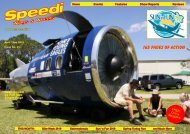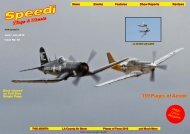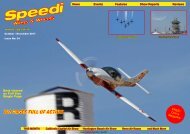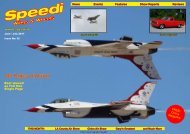Speedi Wings & Wheels Magazine - April / May 2019
The April / May 2019 issue of the FREE online aviation & motorsport magazine, Speedi Wings & Wheels
The April / May 2019 issue of the FREE online aviation & motorsport magazine, Speedi Wings & Wheels
- No tags were found...
Create successful ePaper yourself
Turn your PDF publications into a flip-book with our unique Google optimized e-Paper software.
<strong>Speedi</strong> <strong>Wings</strong> & <strong>Wheels</strong> -- <strong>April</strong> // <strong>May</strong> <strong>2019</strong> -- Page 45<br />
__________________________________________________________________________________________________________________________________________________________________________________________________________________________________________________________________________________________________________________________________________________________________________________________________<br />
WELCOME TO<br />
SPEEDI’S Blog.<br />
Bean Counters are not<br />
my favorite people - and<br />
I refer to professionals<br />
whose job it is to save<br />
companies money by<br />
cutting things to the<br />
bone.<br />
I suspect that the latest<br />
example in the aviation<br />
field involves Boeing and<br />
its 737 Max debacle.<br />
It appears that a<br />
potential cause of the<br />
MCAS malfunction<br />
common to both the Lion<br />
Air and Ethiopian<br />
accidents is that the<br />
system was reliant on<br />
only one Angle of Attack<br />
system to control the<br />
MCAS system.<br />
The Bean Counters<br />
deemed that they could<br />
make more money for<br />
Boeing by making a<br />
second redundant Angle<br />
of Attack system an<br />
optional extra.<br />
The FAA then<br />
determined, no doubt as<br />
a result of input from<br />
Boeing, that the pilots<br />
could easily make the<br />
MCAS system inactive in<br />
the case of an in flight<br />
problem,<br />
I suspect that both the<br />
FAA and Boeing<br />
overlooked what can<br />
happen to even highly<br />
trained pilots in a<br />
moment of crisis. The<br />
brain effectively focuses<br />
on a narrow band of a<br />
problem and does not<br />
have the capacity to look<br />
beyond the immediate<br />
problem in hand.<br />
This has happened time<br />
and time again over<br />
aviation history which<br />
may be why the concept<br />
of crew resource<br />
management evolved.<br />
This is great under 99%<br />
of normal problem<br />
solving in the cockpit,<br />
but clearly in the case of<br />
repeated abnormalities,<br />
such as what was taking<br />
place with the MCAS<br />
malfunction, the 1%<br />
error proved to be fatal.<br />
Here’s what Boeing has<br />
said recently about its<br />
MCAS modifications:<br />
“The additional layers of<br />
protection include:<br />
Flight control system will<br />
now compare inputs<br />
from both AOA sensors.<br />
If the sensors disagree<br />
by 5.5 degrees or more<br />
with the flaps retracted,<br />
MCAS will not activate.<br />
An indicator on the flight<br />
deck display will alert<br />
the pilots.<br />
If MCAS is activated in<br />
non-normal conditions, it<br />
will only provide one<br />
input for each elevated<br />
AOA event. There are no<br />
known or envisioned<br />
failure conditions where<br />
MCAS will provide<br />
multiple inputs.<br />
MCAS can never<br />
command more<br />
stabilizer input than can<br />
be counteracted by the<br />
flight crew pulling back<br />
on the column. The pilots<br />
will continue to always<br />
have the ability to<br />
override MCAS and<br />
manually control the<br />
airplane.<br />
These updates reduce<br />
the crew’s workload in<br />
non-normal flight<br />
situations and prevent<br />
erroneous data from<br />
causing MCAS<br />
activation.”<br />
Great if the software<br />
program was written<br />
correctly, but Boeing is<br />
making many software<br />
changes to the MCAS<br />
system in the light of the<br />
recent accidents.<br />
Is it because Boeing<br />
aircraft were<br />
traditionally not ‘fly by<br />
wire’ aircraft, unlike the<br />
entire Airbus range<br />
which was designed<br />
from the outset as ‘fly by<br />
wire’ aircraft?<br />
Clearly the stretched<br />
fuselage and larger<br />
engines of the 737 Max<br />
dramatically altered the<br />
Center of Gravity which<br />
in turn became critical in<br />
potential stall situations.<br />
But why is Angle of<br />
Attack so important?<br />
Simply put if any aircraft<br />
exceeds its critical angle<br />
of attack the wing can<br />
stall and the aircraft can<br />
crash.<br />
The photo above shows<br />
an AoA indicator for a<br />
general aviation aircraft.<br />
I have such a system in<br />
my own aircraft and it<br />
can be a life saver in<br />
critical situations.<br />
AoA systems started use<br />
in military aircraft to<br />
maximize performance<br />
so that a pilot would<br />
know when his aircraft’s<br />
wing was approaching a<br />
stall. Before such<br />
instruments pilots flew<br />
by feel - the ‘seat of the<br />
pants’ feel when a pilot<br />
could feel an<br />
approaching stall<br />
through his seat.<br />
<strong>Wings</strong> are now so<br />
sophisticated that<br />
electronics can be the<br />
only way to detect an<br />
approaching stall in<br />
modern aircraft.<br />
Back to Bean Counters.<br />
There’s no doubt that<br />
Boeing will suffer<br />
enormous financial<br />
penalties as a result of<br />
this ‘optional extra’<br />
which the accountants<br />
thought by making a<br />
second redundant<br />
system optional would<br />
make more money for<br />
the company.<br />
Remember the optional<br />
heater in cars from the<br />
1950’s. Then it was the<br />
optional radio, etc etc.<br />
Perhaps the matter<br />
would have really been<br />
brought home if some<br />
bright spark Bean<br />
Counter thought that<br />
optional brakes would<br />
make more money for<br />
the company!<br />
I could go on and on, but<br />
I guess you will get the<br />
point . . .
















